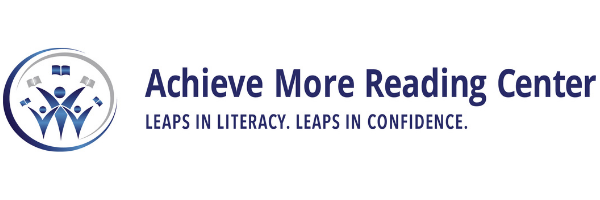FAQ
1. How long will remediation take?
The remediation process will look different from individual to individual. It would be reasonable to estimate one to three years for a child to master the reading, spelling and writing skills necessary. A student may attain grade level reading prior to learning all of the skills, and this is certainly to be celebrated. However it is advisable for students to achieve mastery in all the levels of reading, spelling, fluency, vocabulary and comprehension.
2. How often should my child receive tutoring?
Every student’s circumstances are different, but we highly recommend twice a week. Achieve More Reading Center does not accept students who are unable to attend on a weekly basis.
3. What age does AMRC typically work with? Is there a point at which it is too late to remediate?
We see students of all ages, kindergarten to adult. The journey through the remediation process is much easier when difficulties are caught early. The older a child gets, the more failure they have experienced, creating feelings of inadequacy, emotional walls to learning and negative coping skills. The good news is -It is never, ever to late to get help!
Because dyslexia is genetic we regularly come across parents who were unaware they were dyslexic and never received help. It is not uncommon for these parents, when attending sessions with their child, to be learning at the very same time. These parents are thrilled and would readily agree that it is never too late.
4. Is my child’s struggle a result of something I have done?
No. Reading more would not have changed the circumstance. Dyslexia is not the school’s fault. It is a genetic brain difference.
5. Should I tell my child he/she is dyslexic?
Yes. Click here to See Parents action page
6. Why should I (the parent) sit in on each lesson?
Achieve More recommends parents sit in on lessons so that you can understand and support your child at home. Most parents find it very helpful and are interested in seeing how their child learns. The techniques and games used for reinforcement of skills often become a welcomed learning experience for parents as well. The child whose parents are fully engaged in the learning process, and at-home reinforcement activities with their children see more significant growth, and they see it over a shorter period of time. The involvement of parents has proven to be key to student’s success here at Achieve More. We know we can expect students to achieve more when parents consistently invest even just 15-20 minutes a day working on specific reading and spelling strategies with their child.
7. Will my child receive extra homework from AMRC?
Your child will receive “homework” every week from their tutor. It is in the consistent practice of these short assignments that parents will see steady improvements. We also understand that students receive homework from school and finding a balance can be a challenge. We have some very specific homework accommodations that can help alleviate the dreaded “Homework Wars”. Our goal is always to find ways to support your student while he is on the path to managing grade level materials. Your tutor can offer guidance in this area.
8. My child’s teacher said my child would outgrow the reading struggles, but I am worried. What should I do?
Children do not outgrow reading difficulties. There is a reason your child is struggling and the sooner it is identified the better. DO NOT wait and see. Early identification saves the child from experiencing failure, frustration and provides them with useful tools to overcome whatever is making learning difficult.
Click here to Read Parents – Action Steps
9. Why does my child know a word in one sentence and not the next?
Decoding requires a great deal of energy, and often a child is so worried about tackling the next big word that they forget the ones they just read. This also accounts for the struggles with comprehension. Struggling readers have difficulty holding onto words in order to draw meaning from the text. As a child’s decoding skills become more automatic, we see improvement in these areas.
Visual memory can also be problematic in the identification of high frequency sight words. If a student repeatedly misreads a word, before long the visual image of that particular set of letters becomes tied to the wrong word. For this reason guided practice is a very important part of developing automaticity with sight words. The same holds true for practicing spelling patterns and strategies. The explicit multisensory instruction helps to provide students with tools to overcome the weaknesses that cause these common mistakes.
10. Should I allow my child to listen to some of their reading material? Won’t he/she become a better reader if he continues to practice reading?
While your child is receiving remediation at the center we support having students gain access to reading materials which may be beyond their current reading level via ear reading. This includes the content in grade level textbooks. For example, if Johnny is in the 7th grade but only reading at a 4th grade level, the content in his 7th grade text needs to be made available to him. This can be done through books in an audio format. This accommodation is both reasonable and highly recommended by professionals who understand learning disabilities such as dyslexia.
11. Help, homework is always such a battle.
Homework is often a very difficult part of your child’s day. Struggling learners know full well all the things they are not good at. Homework is a daily reminder of this for our students. Your child has expended tremendous energy all day at school and reserves are running low by the end of the day. It’s time to adjust the manner in which homework is approached. We have some very specific homework accommodations that can help alleviate the dreaded “Homework Wars”. Your tutor can offer guidance in this area. For example, breaking homework into a few 10-15 minute periods a day, doing short assignments will prove to be far more beneficial that an hour or more once a week.
12. Can a child have ADHD and Dyslexia?
Yes, actually, 40% of those with dyslexia also have ADD or ADHD.
13. My child is having behavior issues, is it related?
There could definitely be a correlation. A lot of times, if a child is struggling and they don’t understand why, they are terrified of being found out. Some children would rather people think they are naughty then think they are stupid. Helping your child navigate the emotions and school stresses is a delicate balance.
14. Is there a correlation between speech articulation difficulties and reading struggles?
There certainly can be. If a child has a weakness in the area of phonemic awareness they will struggle with processing sounds. It is not unusual for a child who cannot distinguish or recognize sounds to then have difficulties with articulating those same sounds. There are specific ways to remediate such a weakness.
15. What about being labeled?
When a label explains the reason for a reading difficulty and also directs you to effective instruction, we call that a win-win.
16. My child can read, he/she can’t be dyslexic right?
Some dyslexic children will be able to do fairly well up until 3rd-4th grade. At that point their strategies begin to break down; illustrations in books disappear, predictable story lines are less frequent, multi-syllable words become a regular part of their text, and an average of 3000 new words are introduced every year beyond second grade. It is very common for a student who has shown no signs of reading difficulty to encounter challenges with decoding and comprehension around 8-10 years of age.
17. Why wasn’t this caught sooner?
Although I in 5 students have dyslexia, only 1 in 100 teachers know enough about dyslexia to catch it. Too few educators know what to look for and how to provide the specific instruction in a manner in which our students are able to learn. Our hope is that Dyslexia Awareness will continue to be shared in schools and communities. See Our Services Page for ways to bring Demystifying Dyslexia Presentations to your community. Also, check out Decoding Dyslexia website.
18. What about taking time for extracurricular activities?
Children absolutely need to be reminded of their talents at every opportunity. We encourage parents to make time to develop and encourage their child in their strengths and talents. Finding the right balance can be tricky but do allow time for your child’s interests, homework and just plain fun time, too.
19. What about alternative treatments? Will they work?
There are alternative treatments and teaching methodologies out there that will not cause harm to a student with dyslexia, but the truth is they also will not help. More than a few desperate parents have sought out every possible treatment program with hopes of landing on something-anything- that might work.
We share this information to save your child precious time trying something that will not be effective, and save you money in trying to find answers. Many of these programs work great for other types of learners in other situations. Research provides us with valuable information regarding the principles of appropriate instruction and their effectiveness. The following alternative treatments do not meet the criteria for successful remediation of dyslexia:
• Fast Forward
• Davis Dyslexia Program(Ron Davis – Gift of Dyslexia)
• Hooked on Phonics or other traditional phonics program
• Reading Recovery
• Read Naturally
• Colored lens and overlays
• Vision Therapy
• Sylvan, Kuman, Score, etc Learning Centers
• Exercises in neurodevelopment (Brain Gym)
• Special Diets, Medicines or Supplements
See the International Dyslexia Association issue of Perspectives (Summer 2011) for more information on “Controversial Therapies”. Call IDA at 800-ABCD-123 for a copy.
